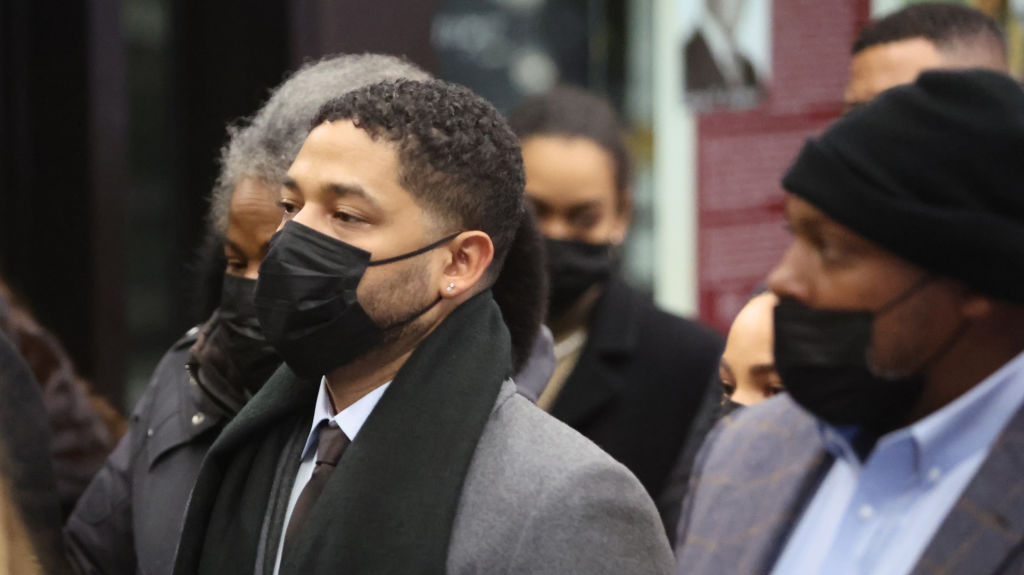If you’re interested in sharing your opinion on any cultural, political or personal topic, create an account here and check out our how-to post to learn more.
Opinions are the writer’s own and not those of Blavity's.
____
For nearly three years, Jussie Smollett and the Chicago police department have been in a litigation battle. The tension between the two parties stems from an alleged racist, homophobic attack on Smollett by two brothers that happened on January 29, 2019. Multiple lawsuits and a long-awaited trial later, Smollett was found guilty of staging a hate crime. Regardless of what actually happened between Smollett and the two brothers, Black people and queer people have, and will, suffer its consequences.
Since Smollett’s initial account of this crime, the entire world has gotten constant updates on the matter. Almost immediately after his initial report, commentators — conservative and not — did not believe Smollett and compared it to the paper-thin list of racial hoaxes carried out by Black people. Around the same time, the FBI also released data that showed a clear increase of anti-LGBT and racially motivated hate crimes, and they have continued to rise since. This could have peaked interest in this case rise, but we also know that Black and queer stories are like candy for social media.
Consuming this case was a roller-coaster for me; as a Black, queer and trans person with experience of violence against my personhood, I immediately sided with Jussie. Many people in my Twittersphere did — until details of the case started to bring Smollet’s account of the hate crime into question. Once we all learned that the attackers were two Nigerian brothers that knew Smollett before the attack, and not two white MAGA bros like we were initially told, Smollett started to be deemed unreliable. The once-concerned tweeters on my feed turned into people feeling tricked, some of them even completely swearing off anything to do with Smollett.
Anti-Black racism and homophobic acts in this country are real. Whether they happened to Jussie Smollett doesn’t negate that, but it does exacerbate the issue of people discounting the things that Black and queer people face.
Many comedians and conservatives started to make jokes about this case and Smollett himself. Well-known (and misguided) commentator Tucker Carlson has dedicated entire segments to it. Dave Chapelle (who has continuous differences with the queer community) included Smollett in his most recent stand-up special. SNL has taken jabs at Smollett — the list goes on and on. Intentionally or not, coverage of this case has made a mockery of the everyday struggles that Black people and queer people go through. Alleged homophobia and anti-Blackness being funny in any way is a thing that we should be scared of, since similar sentiments have brought on a growing rate of fatal violence against trans people, disproportionate police brutality against Black people (which leads to revolting and protests every couple of years) and mass incarceration. When the perpetrators of these American failures are brought to light, there are always sentiments that got them there. Sentiments like homophobia, transphobia and anti-Blackness are cooked and dished out by the media — and consumed until we cook and dish out violence.
This should scare us, but we’re laughing. This should galvanize us into change, but we’re choosing to repeat history.
The kinds of people being amplified when #JussieSmollett goes viral should also concern us. This trial trended on Twitter multiple days last week, and a simple slide-through of the actor’s name hashtagged would’ve exposed you to hundreds of tweets from people with #MAGA in their bios. Since people (including former presidents) have created entire careers by commenting on pop culture happenings and emboldening a volatile, alt-right fanbase, the things that are being amplified are concerning and dangerous for the lives of Black people and queer people. With those tweets often came the assumption that most (if not all) people making similar claims as Jussie are “starting a race war.” Some folks even used the godforsaken “LGBT agenda” claim and threw a slew of homophobic assertions at Jussie around his (possible) jail stay.
When a case about a Black gay man increases the visibility of negative comments about Blackness and queerness, we are emboldening people in the likes and comments of these takes to take on these viewpoints. Constant jokes can cause regular people — people without the money and access of Smollett — to be questioned in their survivorship and gaslighted out of their own experiences. Social media’s impact on real life is well-researched, and we need to act like it. Letting hate crimes against Black and queer people turn into comedy and conservative street cred should be wrong with no questions asked.
I am reminded of the reality of being Black and queer as well as the risks associated with embodying those parts of me every time I crust my eyes open and become conscious. I didn’t need this case to remind me of the sector of people who don’t believe our struggles — but it did, and we have to face it. Smollett’s case may be legally considered a hoax, but factual statistics around hate crimes, incarceration, queerphobic violence and more paint a different picture of the realities of Black people and queer people.
When talking about the Jussie Smollett case, we can’t understate the deadly impacts of confirmation bias. Jussie will be fine, but will other Black people and other queer people once the case isn’t trending and we have to go about lives?
All we can do is stay tuned and do better in the future. Black people and queer people need solidarity, even in moments like this.
